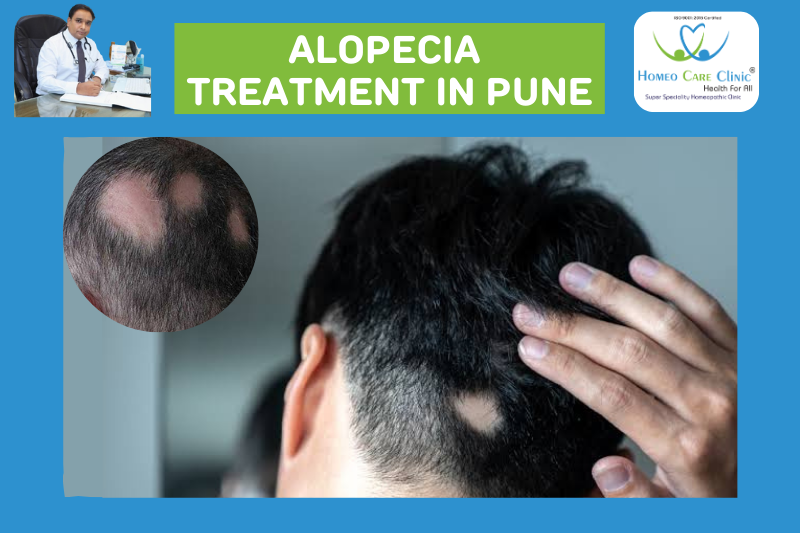Alopecia, commonly known as hair loss, affects individuals of all ages and genders. This condition can range from mild to severe, potentially leading to complete hair loss. Understanding alopecia, its various types, and treatment options is crucial for managing this condition effectively.
Types of Alopecia
- Alopecia Areata:
Autoimmune disorder where the immune system attacks hair follicles, causing patchy hair loss.
- Androgenetic Alopecia:
Also known as male or female pattern baldness, it is the most common type which influences genetics and hormones.
- Telogen Effluvium:
The hair loss is caused temporarily from stress, illness, or hormonal changes.
- Traction Alopecia:
The hair loss is caused by frequent pulling or tension on hair follicles by tight hairstyles.
- Cicatricial Alopecia:
The hair loss causes scarring of the scalp, leading to damage or permanent damage to the follicles of hair.
Causes of Alopecia
- Genetic predisposition that is the major reason in the case of androgenetic alopecia.
- Autoimmune diseases, especially alopecia areata.
- Changes in hormone levels, such as those experienced during pregnancy or menopause, or a thyroid disorder.
- Stress and lifestyle factors, including poor nutrition or lack of sleep.
- Medical conditions, including anemia or lupus.
- Infections, like ringworm of the scalp.
- Medications, including drugs used for chemotherapy or oral contraceptives.
Signs and Symptoms of Alopecia
- Gradual thinning on the scalp or other areas.
- Patchy bald spots (most people experience this symptom in alopecia areata).
- Sudden loosening of hair, typically seen after combing or washing.
- Complete hair loss, as in the case of alopecia totalis.
- Redness or scaling in the affected area if infected.
Conventional Treatment for Alopecia
- Medications
Minoxidil is a topical solution.
Finasteride is oral medication for men.
- Steroid Injections
Very effective for alopecia areata.
- Hair Transplant
Surgical procedure that is used in cases of severe androgenetic alopecia.
- Platelet-Rich Plasma (PRP) Therapy
Uses platelets from the patient’s blood to stimulate hair growth.
- Light Therapy
Laser treatments to stimulate scalp health and hair growth.
Homeopathic Treatment for Alopecia
Homeopathy can be applied to the patient by giving them the right dose of medicine. It works by focusing on the cause and not just the symptoms. A few medicines are:
1. Fluoric Acid
- Best for: Alopecia areata with hair loss in patches, especially in young individuals.
- Usage: Recommended for rapid hair loss associated with brittle hair and a family history of alopecia.
2. Phosphoric Acid
- Best for: Hair loss triggered by grief, emotional stress, or exhaustion.
- Usage: Ideal for patients experiencing diffuse hair thinning along with emotional fatigue.
3. Lycopodium Clavatum
- Best for: Premature balding and hair loss from the vertex of the scalp.
- Usage: Useful when hair loss is accompanied by digestive problems or stress.
4. Sepia
- Best for: Patchy hair loss in women, often linked to hormonal changes or stress.
- Usage: Suitable for individuals with alopecia areata aggravated by fatigue or menstrual irregularities.
5. Graphites
- Best for: Hair loss associated with dry, rough skin or dandruff.
- Usage: Effective for patients with scalp irritation and patchy hair loss.
6. Thuja Occidentalis
- Best for: Hair loss caused by fungal infections or scalp conditions.
- Usage: Promotes hair regrowth while addressing underlying scalp health issues.
7. Silicea
- Best for: Weak, brittle hair with bald patches.
- Usage: Strengthens hair follicles and prevents further damage.
8. Kali Sulphuricum
- Best for: Hair loss with dandruff or excessive scalp scaling.
- Usage: Works well in cases of hair shedding due to scalp infections
Homeopathy is all about customized treatment. Hence, getting the advice of experienced professionals like Dr. Vaseem Choudhary and his team at Homeo Care Clinic would prove very effective.
* Note – Above medicines are for knowledge purpose only. Take the medication only after doctor’s consultation. DO NOT SELF MEDICATE
Tips for Hair Care
- Use mild shampoos and conditioners suitable for your hair type.
- Avoid heat styling tools for straightening or curling.
- Have a nutritious diet containing iron, biotin, and proteins.
- Follow some stress management techniques like meditation or yoga.
- Tie your hair away from your scalp instead of a tight hairstyle.
More Tips
- Natural scalp massages with coconut oil or castor oil to make the circulation rich.
- Hydrate regularly to keep hairs healthy
- Don’t use aggressive chemicals or dyes/ treatments as they may spoil your hairs.
- Consult before time and get to the root of the problem like some disease etc.
In Conclusion
Alopecia Areata is a challenging condition that affects not just the hair but also an individual’s confidence and emotional well-being. For those seeking effective solutions, alopecia areata treatment in Pune offers advanced care tailored to individual needs. With the guidance of experienced alopecia areata specialists, you can explore treatments that address the root causes of hair loss, ensuring a holistic approach to recovery. Early intervention and expert care can make a significant difference, helping you regain your hair and confidence effectively.
Consult Dr. Vaseem Choudhary and his experienced team at Homeo Care Clinic, experts in managing alopecia by using safe, natural, and effective treatments for the solution that suits your hair loss best.



